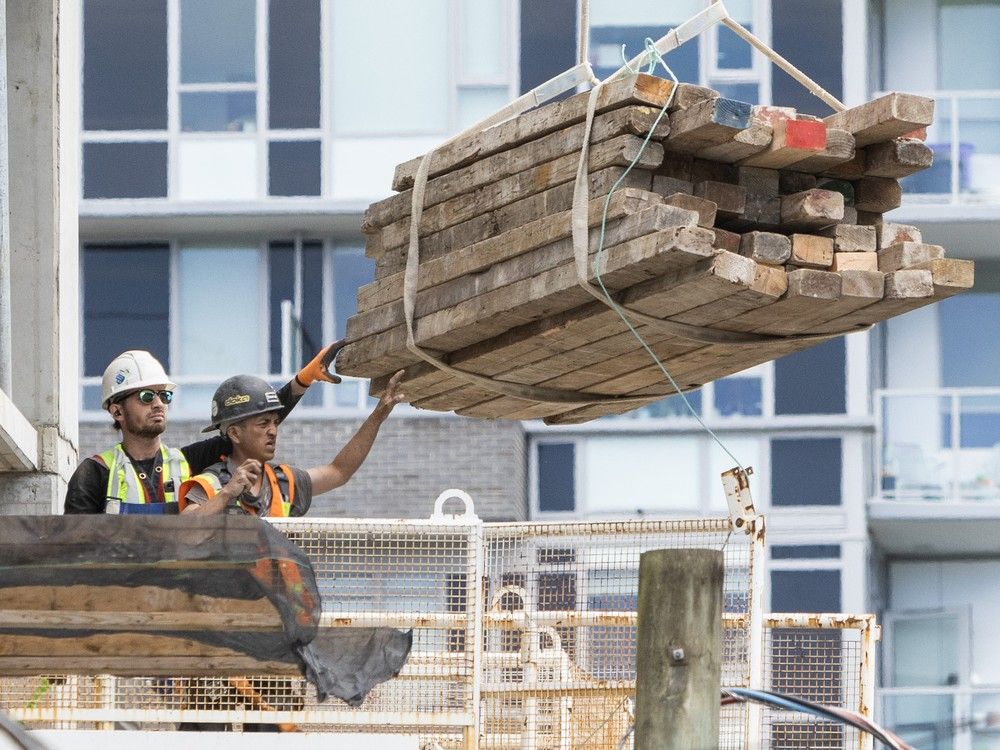
B.C. lost 16,000 jobs in July — the largest monthly drop since the pandemic — with the brunt of the job losses being borne in construction, natural resources, and service-sector finance and education.
Statistics Canada released its latest survey Friday that showed the province’s unemployment rate increase by 0.3 percentage points to 5.9 per cent in July, below the national average of 6.9 per cent.
The losses were highest in construction, which lost 7,600 jobs compared to June, a reflection of the struggling development industry that has seen layoffs due to slumping sales and stalled projects.
Also hard hit was the high-value natural resource sector, which lost 2,500 jobs, and industries like health care (-3,200), finance (-2,800 jobs), professional scientific and technical services (-2,700) and education (-4,200).
Last month’s 16,000 job loss number was the largest monthly drop since April 2021, said Jairo Yunis, director of policy at the Business Council of B.C.
Full-time positions fell by about 29,000 jobs, while part-time jobs rose by 13,000.
So far this year B.C. has only added 8,600 jobs, and 82 per cent of that was part time, said Yunis. “That’s not really a robust number.”

Yunis said such numbers speak to an overall labour market picture of stagnating private-sector jobs, increasing public-sector positions — where part-time jobs increased more than full-time ones — a resource industry that’s shedding jobs, and young people who are struggling to find work.
Jobs in B.C.’s agriculture sector is down about a third in July compared to July 2024. Utilities were also down nearly a quarter, while natural resource jobs, including forestry and mining, were down about 17 per cent.
“We’re also keeping an eye on construction numbers,” he said, noting there’s been two consecutive months of job losses totalling about 10,000 jobs.
“Overall you get a picture of a labour market that is really weak,” he said. “That’s reflective of the broader macroeconomic market we are in and is a reminder of the need and urgency to get the private sector going again.”
B.C. Minister of Jobs and Economic Growth Ravi Kahlon said the numbers show the impact of the Donald Trump administration’s tariff threats and defended B.C.’s performance.
“In July B.C. saw jobs losses compared to last month, but so far this year B.C. has gained 21,400 full-time jobs, the highest increase among provinces,” said Kahlon. Yunis said Kahlon appears to be counting full-time job numbers from December, capturing job gains posted in January, which was a strong month.
Kahlon also touted B.C.’s private-sector employment, which was up by 1,500 jobs compared to last month.
The B.C. Conservative Party said the report paints a grim economic outlook with high levels of youth employment, and noted that many young British Columbians are moving from the province.
“This is an exodus. When opportunity dies, mobility rises. They’re not leaving because they want to, they’re fleeing economic failure,” said Opposition critic Gavin Dew.
Canada recorded 41,000 job losses last month, with the unemployment rate remained unchanged at 6.9 per cent.
Brendon Bernard, senior economist at jobs search site Indeed, said the “malaise” he’s seen in Canada’s labour market has stretched into the summer.
As Canada’s economy remains beset by U.S. President Donald Trump’s trade war, Bernard said he didn’t see clear signs of tariffs impacting the July job numbers.
The report cites the layoff rate — the proportion of people employed in June but laid off in July — was virtually unchanged at 1.1 per cent from the same month a year ago despite the economic uncertainty.
The manufacturing industry and the transportation and warehousing sector — two areas Bernard said he’d expect to see tariff impacts — both posted job gains in July.
Regionally, job losses were also concentrated in Alberta and B.C., not Quebec or Ontario.
“That’s not the markings of all this trade uncertainty dragging on the numbers,” Bernard said. “Instead, we see familiar trends that have cropped up over the past few years: weak youth job numbers, struggles of unemployed people finding new work.”
With files from The Canadian Press